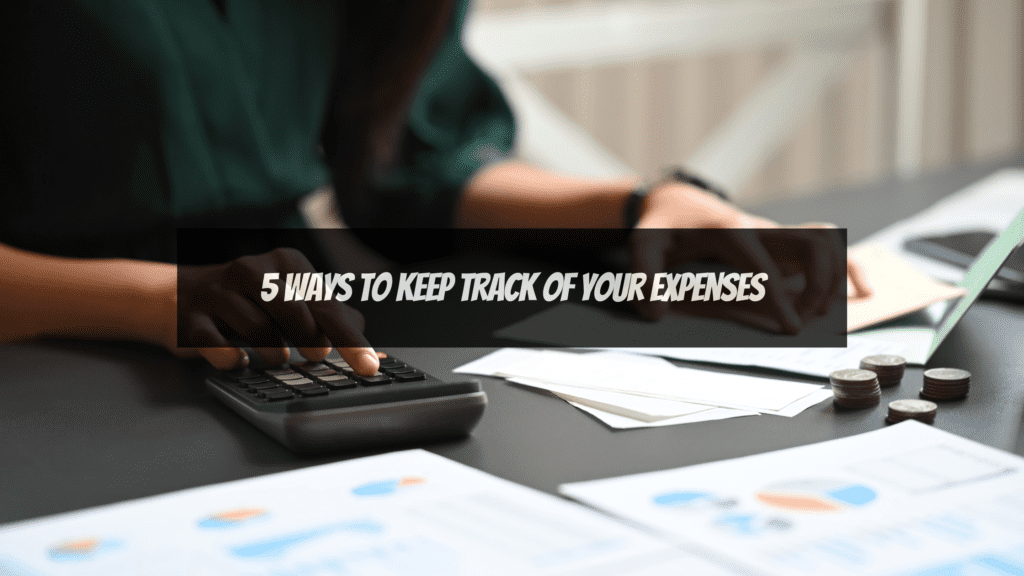There are a few key things you can do to track your finances and keep on top of your money.
Make sure you have a budget in place. Knowing how much money you have coming in and going out is crucial to keeping track of your finances.
Create a budget and stick to it as best you can.
Track all of your expenses. This includes both big purchases and small day-to-day expenses.
Over time, you’ll get a better sense of where your money is going and where you can cut back.
Set up a system for tracking your bills and payments.
This could be as simple as using a notebook or spreadsheet, or there are also plenty
5 Essential Ways To Keep Track of Your Expenses

Maintaining a healthy financial life requires attention and care.
Just as you would track your steps or diet, you need to be aware of your spending in order to save and budget properly.
There are many ways to keep track of your expenses so that you can stay on top of your finances.
Track Your Spending
One way to track your spending is to use a budgeting app or spreadsheet.
This can help you organize your income and expenses so that you can see where your money is going.
You can also use cash envelopes to allocate money for specific purposes such as food, gas, or entertainment.
This method can help you stay mindful of your spending and avoid overspending in one area.
Categorizing Expenses
Categorizing expenses is a helpful way to track your finances and see where your money is going.
By breaking down your spending into different categories, you can get a better sense of where you can cut back or save money.
There are a few different ways to categorize expenses, but one common method is to break them down into fixed, variable, and discretionary expenses.
Fixed expenses are those that stay the same each month, such as rent or mortgage payments.
Variable expenses can fluctuate from month to months, such as utility bills or groceries.
Discretionary expenses are those that are not essential, such as entertainment or eating out.
Tracking your expenses can help you develop a better understanding of your spending habits and make informed decisions about where to allocate your money.
List out All your Transactions
Any personal finance journey starts with knowing where your money is going.
To do that, you have to track every single one of your transactions.
That’s right, each and every purchase, no matter how small, should be logged somewhere.
This may seem daunting at first, but it’s actually not as difficult as it sounds.
There are a few different ways you can go about tracking your transactions.
You can use a simple excel spreadsheet, a notebook, or one of the many personal finance apps that are available.
The important thing is to find a method that works for you and to be consistent in using it.
Once you start tracking your transactions, you’ll be amazed at how quickly you gain an understanding of your spending patterns.
And that knowledge is the first step in taking control of your finances.
Budgeting or Expense-Tracking App
If you’re looking to get a handle on your finances, one of the best things you can do is start tracking your spending.
A budgeting or expense-tracking app can be a big help in this process, as it can give you a clear picture of where your money is going each month.
There are a variety of apps available, so it’s important to find one that fits your needs and preferences.
Once you have selected an app, setting up your account is usually a quick and easy process.
From there, you’ll just need to log your spending as you go.
This doesn’t have to be a time-consuming task – even a few minutes each day can make a big difference.
If you’re not sure where to start, there are plenty of helpful resources available online.
With a little effort, you can soon get a better handle on your finances.
Review Your Accounts
Reviewing your accounts is the first step to taking control of your finances.
By looking at your account statements, you can get a clear picture of where your money is going and where you may be able to cut back.
Reviewing your accounts can help you catch any errors or fraudulent activity.
If you notice anything suspicious, be sure to report it to your financial institution right away.
By staying on top of your finances, you can ensure that your money is working for you.
Why Should You Keep Track of Your Expenses?
There are a number of good reasons to keep track of your expenses.
The most important reason is that it can help you stay on top of your finances and ensure that you are living within your means.
If you don’t keep track of your expenses, it’s easy to let small purchases here and there add up without realizing it.
Another reason to keep track of your expenses is that it can help you spot areas where you may be able to save money.
This can lead to financial problems down the road.
Track Your Finances – Conclusion
The above ways are very easy and effective ways to track your finance.
This can help you keep track of your income and expenses, and see where your money is going each month.
Figure out what works best for you, and you can make the process simpler and less stressful.
